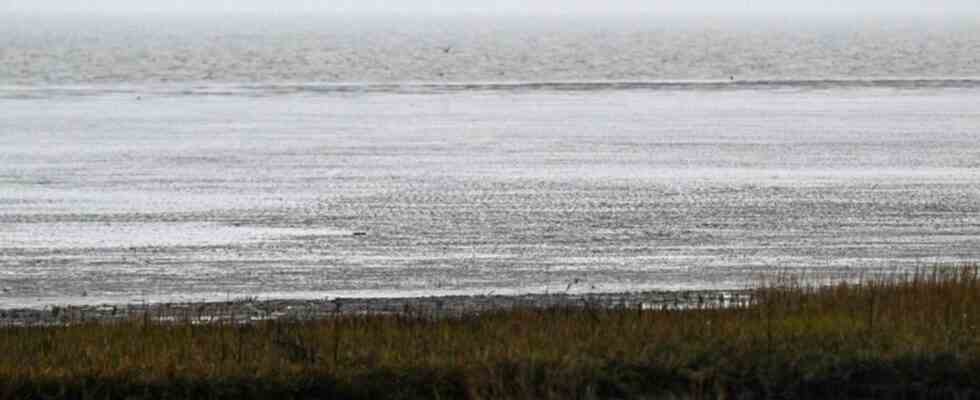environment
Wadden Sea neighbors agree on more climate protection
The Watt in front of the beach of Dangast in Nidersachsten. The 14th trilateral Wadden Sea Conference of Germany, Denmark and the Netherlands ends on December 1st, 2022. photo
© Sina Schuldt/dpa
The climate crisis, the loss of species and growing industrialization are putting the Wadden Sea under pressure. At a conference, the three residents agree to do even more to protect the sensitive ecosystem.
More natural climate protection, safety in shipping and joint research: Germany, Denmark and the Netherlands agreed at their joint Wadden Sea Conference in Wilhelmshaven to work together even more closely to protect the UNESCO World Heritage Site.
A comprehensive management plan that was developed during the German presidency of the Wadden Sea Cooperation over the past four years should also help. With him, the efforts that exist for the Wadden Sea protection in the countries should be better coordinated.
“The strength now is that we have a plan that can now be implemented,” said Parliamentary State Secretary in the Federal Environment Ministry, Bettina Hoffmann, who attended the conference on behalf of the ill Federal Environment Minister Steffi Lemke (Greens). At the Intergovernmental Conference, which takes place every four years, government representatives from the Wadden Sea countries agree on their joint action plan. More than 250 experts from associations and institutions also discussed in many workshops and events. Now Denmark will take over the presidency.
Because of the ongoing formation of a government in Denmark, the signing of a joint declaration, as is usual at the Wadden Sea Conferences, was postponed in Wilhelmshaven. It is now to take place after a new government has taken office in Denmark. However, the states agreed on fields of action in a joint declaration. An overview:
Natural climate protection
“The Wadden Sea can also make a valuable contribution in the fight against the climate and biodiversity crisis,” said Hoffmann. For example, salt and seagrass meadows could absorb “considerable amounts” of gases that are harmful to the climate. “We would like to strengthen this function together with the coastal states through extensive measures as part of the action program for natural climate protection,” said Hoffmann.
Joint research
In order to research the consequences of climate change and human activities for the Wadden Sea in more detail, the residents want to establish a jointly coordinated research program. Funds of 15 million euros are to be made available for this purpose, of which Germany intends to provide eleven million euros. The joint research is also intended to develop basic principles and measures to make the Wadden Sea more resistant to climate change.
oil and gas production
Environmental protection groups had demanded that the residents agree to phase out oil and gas production in the Wadden Sea by 2030. The residents did not have a common goal for this. The government representatives referred to national plans. Christianne van der Wal, Dutch Minister for Nature Conservation and Nitrogen, said both nature conservation and economic activities are necessary in the Wadden Sea. “I think it’s wrong to just say, ‘We’re going to stop economic activities completely, but you have to strike a balance so that both can be achieved.
wind power at sea
The Wadden Sea neighbors want to coordinate the expansion of offshore wind energy, which should progress in the North Sea in the next few years and also affect the Wadden Sea. “It is precisely the task that we do it in such a way that the intervention is minimized as much as possible,” said Schleswig-Holstein’s Environment Minister Tobias Goldschmidt (Greens). To avoid having to lay power lines from the wind farms to the mainland through the Wadden Sea again and again, routes should be bundled and cables should be more powerful.
Maritime safety
In order to prevent accidents like that of the container freighter MSC Zoe 2019, the states agreed to evaluate the special shipping area set up 20 years ago for the particularly sensitive Wadden Sea and possibly to propose further measures for better protection to the International Maritime Organization. What that could be was initially left open. The most recent discussion was about the mandatory installation of inclination sensors in ships, with which captains can be warned at an early stage.
Environmental protection organizations such as the WWF see a need for further action despite the agreed projects. “The underwater world of the national parks in the Wadden Sea can still be fished over almost the entire area, there is still no end in sight to the extraction of fossil oil and gas even in the protected area, and Hamburg wants to deposit millions of tons of Elbe silt near the bird island of Scharhörn, with great damage to the national parks,” complained the head of the WWF Wadden Sea Office, Hans-Ulrich Rösner.
Agreements for more environmental protection were also made on the fringes of the conference. For example, 39 environmental protection associations, port companies and business associations agreed to make shipping and ports in the world natural heritage site more sustainable. According to this, light pollution should be reduced and dredging work in ports should be made more environmentally friendly. As early as Monday, German motor yacht clubs and sailing associations committed themselves in a voluntary declaration to promoting the phase-out of fossil fuel drives in leisure shipping. Accordingly, the signatories want that from 2026 onwards no more ships and boats with a fossil combustion engine will be purchased.

